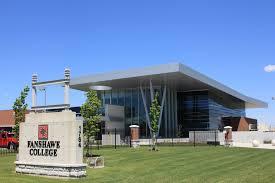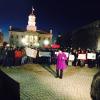Dear Peter Devlin,
This open letter is to make you aware of incriminating issues that Hard of Hearing and Deaf students have experienced at Fanshawe College. This letter is compiled by a group of Deaf people consisting of past, present and future students of Fanshawe College. We met in February 2015 to discuss our concerns and decided to not ignore these issues any longer.
Fanshawe College has failed these Deaf students and deprived them of their fundamental human rights to the education that they paid and came for. The majority of the group who met in February experienced similar barriers, prejudices, unprofessional behaviour by staff, discrimination and negligence by Fanshawe College.
The primary purpose of Fanshawe College is to provide an accessible place of learning while adhering to Accessibility for Ontarian with Disabilities Act (AODA), Ontario Human Rights Code (OHRC) and the general principles of inclusion. Fanshawe College has longstanding roots in the London community which also has a strong Deaf presence due to London being home to the Robarts School for the Deaf. It is imperative that these issues are identified and discussed openly, that swift action is taken to ensure that Fanshawe becomes an inclusive place of education for all members of this community.
We the members of London’s Deaf community have lost our confidence in Fanshawe College. We hope that steps will be taken to restore confidence in your administration and the college.
Issues
The obstacles faced by the individuals in this group can be echoed by other Deaf in other communities and other facilities. However, we must confront these issues in every circumstance to ensure that change happens and the isolation of the Deaf stops. The paternalistic practices we identify are systemic, evident throughout the college and highlighted within the department of the accessibility counsellor. The issues identified in the group meeting were discussed in confidence with each participant consenting to share these issues in the hopes that they will be heard.
I. Accessibility Counsellor Role
A majority of issues discussed among the group reflected the difficulties arising from the fact that the accessibility counsellor seems to be the one point of contact for every aspect of their educational endeavours with Fanshawe College. The counsellor has failed in providing the duty of care owned to past, current and prospective students;
1. The role of the accessibility counsellor has not been clearly and concisely defined for us. The demonstrated role appears to be that the accessibility counsellor is positioned as a figure of authority and an expert regarding the needs of the Deaf students, acting as an interpreter advisor, counsellor and decision maker. Furthermore, as a counsellor, the demonstrated role appears to be that the position is to advise students about their chosen career and education paths as well as accessibility for all Deaf students. By expecting one role/person to fulfill all of the diverse needs of student life, Fanshawe has succeeded in marginalizing the students by limiting their resources. Putting them at risk for manipulation and enforced helplessness. Other students have a range of resources available; Deaf students have one go-to person acting as the conduit for their educational/career choices with no accountability on behalf of the college.
2. The emphasis on having the position of accessibility counsellor as a ‘one-size-fits-all’ response to the concerns of Deaf students results in a confusion within the organizational structure. A counsellor who has knowledge of American Sign Language – regardless of fluency - may not have the appropriate training or expertise to assess accommodation needs for Deaf students. Nevertheless, a counsellor should not be given the responsibility or the right to speak for the Deaf person.
3. Deaf students should be given the respect of having confidential resources. By combining the roles of counsellor and Deaf accessibility expert into one position, Fanshawe College has set up a situation where the Deaf students have reduced access and biased services. As it currently stands students are subjected to paternalistic oversight.
4. Despite setting up the position of ‘accessibility counsellor,’ the college fails to ensure adequate accessibility are provided to meet all current and prospective students’ needs.
5. The accessibility counsellor has neglected students by failing to be prompt in response to their needs;
5.1 Failing to ensure appropriate accommodations is being made
5.2 Failing to attend scheduled appointments
5.3 Failing to reschedule the appointment within an appropriate time frame
5.4 Failing to provide adequate preparation materials for teachers and interpreters
6. The position of accessibility counsellor must have an acceptable and respectful code of ethics identified with an identified complaint process in place for students to identify/address issues. Currently, students have experienced the following:
6.1 Students’ private personal information was shared with the contracted interpreters – private and personal information is not needed by interpreters to complete their duties
6.2 Some students feel that they have been given less support and discouraged from pursuing higher levels of education which has hindered their ability to succeed in their program(s)
6.3 Some students were persuaded to withdraw for false reasons and with an understanding that they would get a full refund from the College. When discussing obstacles, the question of “are you considering a withdrawal from the program” was asked instead of the question of “what do you need to achieve success?” Such a distinction in phrasing supports discouragement rather than empowerment and clearly demonstrates a need for training for the accessibility counsellor as well as a clear standard for ‘success’ defined within the role that ties performance to desired outcomes.
6.4 The accessibility counsellor role requires that the staff member wear too many hats, many of which result in breaching professional boundaries in one area to fulfill perceived requirements in another area and conflict of interests.
6.5 Some students have identified a high level of supports available while others have identified a reduced level of supports which points to a degree of favouritism within the system.
6.6 The process of scheduling interpreters for each Deaf student is faulty and results in inadequate accommodations.
7. The responsibilities of theIn addition, the accessibility counsellor should be required to educate third parties about the responsibilities for providing accommodation. Students have been excluded from participation in required off-campus activities due to this failure in communicating the needs of interpreting service to the third parties.
By failing to address this issue, Fanshawe College is setting their Deaf students up for failure and violating the students’ rights to the education for which they have paid – an education you promised to provide when you accepted that payment!
Counselling & Accessibility Services Department and Fanshawe College Administration
1. Ineffective accessibility service with no oversight or accountability as evidenced by the aforementioned concerns.
2. Failing to provide accessible education due to:
2.1 Inadequate, qualified interpreting services i.e. quality of interpreter, incomplete scheduling, lacking course preparedness materials, failure to provide interpreters for prolonged exam times or change in class schedules.
2.2 Failure to provide reasonable accommodations in a timely fashion i.e. FM system, qualified interpreters, and notetakers were not provided.
2.3 Lack of training for educators and staff regarding the requirement to provide accommodation and accessible services appropriate for the needs of Deaf students.
2.4 Inflexible program courses which fail to provide appropriate and relevant adjustments to accommodate a Deaf student’s physical limitations.
2.5 Unfairly recruiting hard-of-hearing and Deaf students into the college with knowledge that it’s interpreting capacity is overtaxed and understaffed.
3. Having failed to plan and staff accessibility services adequately for the students Fanshawe recruits or accepts into its programs, the college refuses to refund student tuitions when they are unable to continue pursuing this education due to the increased difficulty created by the college’s inadequacies. By so doing, the college is actually benefitting financially by contravening the AODA; money is saved by spending on services for accessibility and money is acquired from students who are unable to continue.
4. Interpreters are assigned inappropriately as consideration is not always given to the matter-specific vocabulary required in specific academic streams (eg. Technical language vs sociological language).
5. Less qualified replacement/temporary interpreters provided during vital course and exam times resulting in students being unfairly disadvantaged.
6. The relationship between the accessibility counsellor’s department and the students is marked by frustration, conflict and poor communication.
7. Interpreter assessment and screening were not effectively utilized which undermined the quality of interpreting service which, in turn, left students with so little hope of success that they were forced to withdraw or ended up failing their courses.
In Hindsight
The current system and policies at Fanshawe College are failing to meet the needs of its Deaf students. In particular, the situation with the accessibility counsellor, the college has failed to protect students due to a lack of appropriate policies and accountability. It seems that, given the scope of the issues, the Counselling and Accessibility Services department has set up a process which is imbued with power but without checks and balances to ensure that the department’s goals are being achieved. As a result, student needs are not met through that office.
The issues presented by this concerned group clearly show a strong pattern of wrongdoings within the Counselling and Accessibility department and failure of administration to provide strong leadership and training among its accessibility service staff.
The bottom line is that Fanshawe College has allowed the negative situation to happen by not taking responsibility for ensuring the department’s goals were achieved and by not following up with the consumers to ensure that the their needs were met.
Next Steps
Fanshawe College should take steps to correct these broken processes and system that has wronged those that came for education. To restore the confidence in Fanshawe College’s inclusion policy and ability to deliver an accessible and inclusive education, the accessibility department must be revamped with frontline consultation in its process by this group –the consumers and primary stakeholders in this process! Fanshawe College is a place of learning not a place where barriers to education exist.
We ask that Fanshawe College facilitate a meeting at the main campus within 6 weeks of receipt of this letter, by May 27th, 2015 latest. We ask that Fanshawe College be prepared, at this meeting, to outline a course of action to address the issues outlined in this letter. As well as begin to plan resolutions and to discuss our concerns directly.
We ask that any communication be made through, Jason Rose, who will act as liaison between Fanshawe College and the concerned group.
Send communications to:
Jason Rose
704-1669 Jalna Blvd, London, Ontario, N6E 3S1
T: 519.709.3902 (TEXT ONLY)
E: [email protected]
We want our education now, not one year later!
Signed by:
PAST, PRESENT, FUTURE DEAF STUDENTS
















